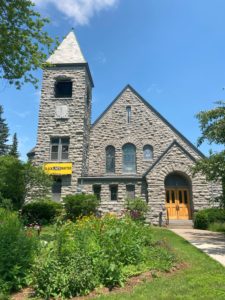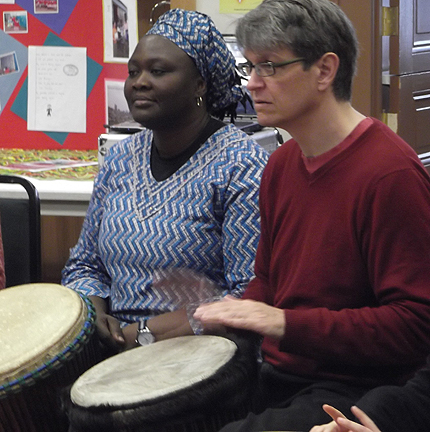Our Mission
Creating a welcoming, compassionate faith community, committed to social justice and open to wonder.
Together we strive to:
Foster a spirit of inclusion and connection
Encourage exploration of truth and meaning
Nurture respect for all life and the environment
Live our values in the North Country and in the wider world
Our Church
We are one of more than a thousand Unitarian Universalist congregations in North America. Our congregation was formed in 1825, and has occupied the plot of ground where the church now stands since 1827. Today we are a congregation of more than 200 members and friends. Most of us live in Potsdam and Canton, but people attend from all over St. Lawrence County. Our members come from a wide range of religious backgrounds, and from no religious identity at all. We are young and old, single and partnered, gay and straight, natives and newcomers to the area. What binds us together are spiritual principles that take the form more of deeds than of creeds.
Our History
The Unitarian Universalist Church of Canton was founded in 1825 as a Universalist congregation. Its first building, a brick structure with a wooden tower, was dedicated in 1829 and used until 1897, when the present Canton gray marble church was dedicated. Through the efforts of members of our church, St. Lawrence University and its Theological School were founded in 1856. The presence of the Theological School, which closed in 1965, brought many well-known Universalist and Unitarian ministers and religious educators to our church community. Read more history of our Canton church here and a general overview of UU history here, or click on the links below:
UU Church of Canton New York History
Unitarian Universalist History
Our 200-member congregation is organized democratically, and membership is open to all. The congregation, by majority vote, chooses its own ministers and has final authority over all aspects of church life. The congregation elects a Church Council to whom it delegates much of the business and policy-making of the church. Programs are planned and coordinated by a variety of committees that oversee worship, religious education, outreach to newcomers, social action, care of our building and grounds, our Memorial Garden, and many other areas. Ours is a diverse and inclusive religious community, welcoming the full participation of all without regard to race, class, gender, sexual orientation, or physical challenge.
To maintain our building, staff, and programs, our church is supported financially by the pledges of its members and friends, and by a few special fundraising activities. Each year, the congregation approves an operating budget based on the projected income, and we hold a pledge campaign during which each of us is asked to make a financial commitment in accordance with our circumstances.
Our Shared Values
Unitarian Universalism is a living tradition that has changed in many ways from the original Christian roots of its Universalist and Unitarian heritages, and it continues to evolve today. Most recently, this evolution has taken the form of adopting new language to describe who we are as UUs. At General Assembly in June 2024, UUs voted to replace existing Seven Principles and Six Sources language in our bylaws with language describing Unitarian Universalism through these shared values, all centered around love:
- Interdependence: We honor the interdependent web of all existence and acknowledge our place in it.
- Pluralism: We are all sacred beings, diverse in culture, experience, and theology.
- Justice: We work to be diverse multicultural Beloved Communities where all feel welcome and can thrive.
- Transformation: We adapt to the changing world.
- Generosity: We cultivate a spirit of gratitude and hope.
- Equity: We declare that every person is inherently worthy and has the right to flourish with dignity, love, and compassion.
For some within Unitarian Universalism, there are seven Principles which reflect deeply-held values and serve as a moral guide. The wisdom and spirituality of these Principles are drawn from sources as diverse as science, poetry, scripture, and personal experience.
 These seven Principles are as follows:
These seven Principles are as follows:
- The inherent worth and dignity of every person.
- Justice, equity and compassion in human relations.
- Acceptance of one another and encouragement to spiritual growth in our congregations.
- A free and responsible search for truth and meaning.
- The right of conscience and the use of the democratic process within our congregations and in society at large.
- The goal of world community with peace, liberty and justice for all.
- Respect for the interdependent web of all existence of which we are a part.
The sources from which we draw wisdom include:
- Direct experience of that transcending mystery and wonder, affirmed in all cultures, which moves us to a renewal of the spirit and an openness to the forces which create and uphold life.
- Words and deeds of prophetic people that challenge us to confront powers and structures of evil with justice, compassion, and the transforming power of love.
- Wisdom from the world’s religions, which inspires us in our ethical and spiritual life.
- Jewish and Christian teachings, which call us to respond to God’s love by loving our neighbors as ourselves.
- Humanist teachings that counsel us to heed the guidance of reason and the results of science, and warn us against idolatries of the mind and spirit.
- Spiritual teachings of Earth-centered traditions that celebrate the sacred circle of life and instruct us to live in harmony with the rhythms of nature.
Voices of a Liberal Faith
Welcome to Unitarian Universalism! This video from the UUA tells the story of our faith through powerful imagery and inspirational testimonials. In it, you’ll see and hear Unitarian Universalist leaders and members share elements of UU history, theology, what it’s like to worship with us, how we educate our children, and more. You’ll also learn about our deep commitment to social justice and inclusiveness.
